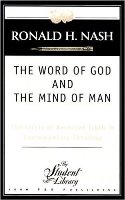One of the most fundamental tenets of the Christian faith is that God speaks. God is a talking God. Moreover, he has made us in his image so that we can hear from him and learn from him. God speaks for us to hear and understand – the doctrine of divine revelation.
But this concept, basic and essential as it is, has not been recognized by all professing Christians, and the last two hundred years or so have witnessed a variety of challenges to it. Does God reveal himself? Does he reveal himself propositionally? Is he so distant from us that we could not share his thoughts? Are human words capable of carrying a cognitive word from God? Does “truth” look the same to him as it does to us? In short, is objective knowledge of God possible? And what, then, is the Bible?
In his The Word of God and the Mind of Man the late philosopher-theologian Ronald Nash explains and defends the historic evangelical understanding of divine revelation, but he is the first “to trace this position back to its roots.”
“a systematic examination of the theoretical foundations and historical development of this position is not available elsewhere. Since many Evangelicals are beginning to drift from the former consensus about the indispensability and legitimacy of a belief in cognitive or propositional revelation, a fresh examination of this view and its major competition can be helpful at this particular time in the history of the church” (9).
Nash traces and challenges the major forms of “Christian agnosticism” over the centuries and “offer an alternative theory that makes human knowledge about God possible” (13). He tackles the philosophical and theological issues that cluster around revelation, language, and truth and examines the developments in the history of philosophy that have led to skepticism about our human ability to know God truly. he also critiques the arguments of those who deny that the verbal revelation of the Bible is capable of communicating literal, propositional truth. Nash argues that the solution to epistemological skepticism is rooted in the logos of God and his communication of his logos to human beings who are created in his image. God has constructed our minds to share in his rational nature and to express truth through language. As a result, human beings can truly know things about God, and the Bible can be accepted as completely true, reliable, and knowable.
It’s an illuminating study of renewed relevance to postmodern minds.
Table of Contents
Preface
Introduction: The Unknown God
Chapter 1 Hume’s Gap: The Divorce of Faith and Knowledge
Chapter 2 Theological Agnosticism from Kant to Ritschl
Chapter 3 The Assault on Propositional Revelation
Chapter 4 A Defense of Propositional Revelation
Chapter 5 A Brief but Necessary Interlude
Chapter 6 The Christian Logos
Chapter 7 Rationalism and Empiricism
Chapter 8 The Christian Rationalism of St. Augustine
Chapter 9 The Religious Revolt Against Logic
Chapter 10 Reason and Revelation
Chapter 11 Reason, Revelation and Language
Chapter 12 Revelation and the Bible
You may like to see our Summary of this book also.
Fred G. Zaspel
Buy the books

The Word Of God And The Mind Of Man